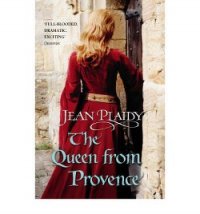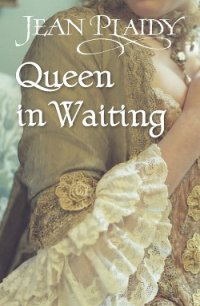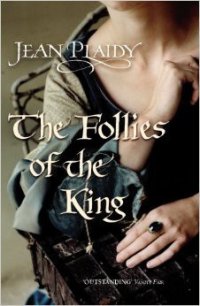The Red Rose of Anjou - Plaidy Jean (книги онлайн полные версии бесплатно .TXT) 📗
The door was shut on her. There were guards outside.
Alone! A prisoner!
If I could but have my son back alive and well I would ask nothing more, she mourned.
###
Edward of York was flushed with triumph. The people of London welcomed his victory. This would mean peace and peace meant trade. The hated Margaret was in the Tower; the so-called Prince of Wales had been slain in battle; this was the end of the Lancastrian cause. The red rose was trampled in the mire and the white one was victorious.
‘Let us have an end of wars,’ said Edward. ‘Let us seek to make our country great through peaceful means.’
His brother Richard listened to him, his admiration shining in his eyes.
Edward laid his hand on his arm. If only he could trust George as he could Richard.
As they sat at the table with their most trusted friends Edward talked of the future. ‘The country is being crippled by wars. We have enough enemies overseas. They rejoice in the conflicts which torture our realm. There must be an end to them.’
There was agreement all around the table.
‘Margaret is subdued at last. The death of her son has done more to bring her to reason than any battle could.’
‘It is time she realized she has no chance of ousting you from the throne,’ said Richard.
‘She will never realize that...while Henry lives.’
There was a hushed silence round the table.
###
Henry rose from his knees. His long hair fell about his face and he pulled his tattered coat closer about him.
It was cold in the cell at night. The thick stone walls shut out the warmth of the day. Not that he noticed much. As long as he could pray and meditate and take comfort from the spiritual experience he could live.
The food they brought him was often inedible. He did not care very much. Occasionally he ate and that was enough to give him the strength to pray.
He went to his bed and lay down.
He found comfort in thinking of his beautiful colleges at Cambridge and Eton. He hoped the boys were managing to live in some comfort there. If he were stronger, if he were free he would like to build more colleges. That was the happiest time of his life when he had first married Margaret and they had had those meetings with the architects...Perhaps it would come again.
He did not want all the tribulations of kingship. He wanted peace. That time when he had been in the monastery in hiding...that had been a happy time. How he had loved to mingle with the monks, to sit at their table...to meditate and pray.
Someone was in the cell.
They did not usually come at this hour. There were several of them.
They were standing round the bed.
He knew suddenly that they were going to kill him.
He was murmuring something. One man leaned forward and heard him mutter: ‘May God give you time for repentance whoever you are who lay your sacrilegious hands on your Lord’s anointed.’
Then he thought: Into Heaven, O Lord, receive your servant.
Life was flowing out of him. It was not very difficult. He was so weak and fragile. He did not fight. Pillows over his face...and so drifting into eternity.
###
So King Henry was dead.
He had died of a broken heart, said Edward and his friends. It was reasonable. It was the end of hope for him. The battle of Tewkesbury lost. His son slain in battle. There had been nothing left for him to live for.
‘Let his body be exposed and lie in St. Paul’s where all may see it,’ commanded Edward. ‘There will be people to say that he met his death by foul means. That is something we must avoid at all costs.’
He was right. People did say it. It was so strange that he should die on the very night when Edward entered London, when Margaret and Anne Neville should have been sent to the Tower.
Others—Yorkist supporters—said that it was precisely due to the shock of all that had happened that he had died.
The King, however—firm on the throne now—insisted that all honour should be done to Henry.
His body was taken by barge to Chertsey and with great respect buried in the lady chapel in the abbey there.
FINALE
The years were slipping past – the long, meaningless years. Life had been harsh to her, or was it as her sister Yolande had said, that she had never understood how to live. Yolande was happy with Ferri and her children, never seeking to extend her ambitions. Yolande had never had any patience with her. Perhaps she should have listened to her sister.
It was all too late now, although they could have lived together. No, they would never live in harmony. Better to be lonely and at peace.
She supposed she could not complain of Edward’s treatments. He was now securely on the throne, popular with the people, still possessed of that charm even though he had grown obese and was as lecherous in his maturity as he had been in his youth.
She recognized now that there was a kingliness about him which Henry had lacked. Poor ineffectual Henry! How ironical of fate to give her such a husband.
She had stayed in the Tower only a short time and she believed it was Queen Elizabeth Woodville who had prevailed on the King to make life easier for her so that she passed from the care of one great lady to another and spent her captivity as a guest in their stately homes. Then the King of France paid Edward a ransom for her and after five years of wandering captivity she sailed from Sandwich.
How strange it had been to say farewell to the land to which she had come full of hope and ambition all those years ago—it must have been thirty; and stranger still and sad to return to her native country.
Freedom. That was a wonderful feeling. For a brief period she had wondered whether she could start again; whether she could snatch something from the tumbled ruin of her life. She would go to Paris to thank Louis for helping her to return to her country and buying her freedom. When his reply came that he would not be in Paris and she would do well to go to her father, she understood.
She was of no importance now. Her husband was dead...murdered, she thought fiercely, and the name of Richard Duke of Gloucester had been mentioned in that connection. But it was Edward of course, Edward who had asked for his death...as Henry the Second had asked for that of Thomas a Becket.
But what did it all matter, now that her beautiful son was dead?
Rene had provided her with the Chateau de Reculee near Angers and here she lived in utter melancholy.
Yolande had said she must make a new life but she quarrelled continually with her sister, who did not understand what it meant to know that her husband had been murdered and the greatest tragedy possible had befallen her—she had lost her beloved son.
Nothing could comfort her. Even her beauty was lost, for continual weeping and the violence of her passions which she seemed to find some satisfaction in letting loose had made her hollow-eyed and worse still her skin had grown dry and so scaly that those about her believed she was suffering from a form of leprosy.
She would see no one. This was the final affliction for one who had been beautiful and accepted her beauty as a natural right.
Her father died and she felt then that she had lost everything she cared about.
She herself was only waiting for death.
Just after Rene had died she decided to make a pilgrimage to Dampierre and, heavily veiled to hide her disability, she set out.
She reached Dampierre and rested at the chateau there and while she was there she was overcome by such a lassitude that she could not rise from her bed.
‘Praise God,’ she said, I think I am done with my troubles.’
Her premonition proved correct. In the fifty-first year of her life, eleven years after the death of her son and husband, Margaret of Anjou closed her eyes for the last time.




